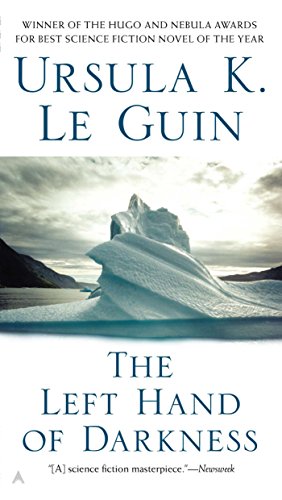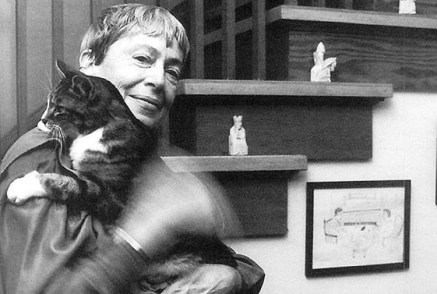
“The unknown,” said Faxe’s soft voice in the forest, “the unforetold, the unproven, that is what life is based on. Ignorance is the ground of thought. Unproof is the ground of action. If it were proven that there is no God there would be no religion. No Handdara, no Yomesh, no hearthgods, nothing. But also if it were proven that there is a God, there would be no religion. … Tell me, Genry, what is known? What is sure, unpredictable, inevitable — the one certain thing you know concerning your future, and mine?”
“That we shall die.”
“Yes, There’s really only one question that can be answered, Genry, and we already know the answer. … The only thing that makes life possible is permanent, intolerable uncertainty: not knowing what comes next.”
Foreword : I had planed to write this article when I created my blog. But a few days after I started “Make me thy lyre” I was immensely sad to hear that Ursula Le Guin had died. She was 88. The following text will be my personal tribute to her.
I have read a few science-fiction novels. It’s a genre that I was unfortunately obliged to neglect for the last couple of years. I was too involved with school classics, and the (French) academic world is science-fiction and heroic fantasy unfriendly. Needless to say that I do not agree with that, especially when you know that such novels as The Left Hand of Darkness exist.
A title can clearly be the one key thing that will make me want to read a book. I was browsing through the Book Depository’s bargain shop once when I saw these words. I remember it kept resonating in me for days. Hence I bought it and read it in something like two days.
On the first edition cover, in 1969, the publisher wrote : “Once in a long while a whole new world is created for us. Such worlds are Middle Earth, Dune – and such a world is Winter.”
Winter is the planet where the novel is set. It is a frozen and forbidding land. Where human have no gender. The major protagonist of the novel, Genly Ai, is a Terran male anthropologist sent by the Ekumen (a sort of interplanetary UN) to study this planet (which is actually name Gethen in the native tongue of its people), and to entice the Gethenian governments to join the 83 planets that are members of this organisation. There are two rival nations on Gethen : Karhide and Orgoreyn.
So, the Gethenian humans have no gender. They do not understand what female or male means. Most of the time they are androgynes (and even that term is not that relevant in the novel’s logic). Once a month their sexual attributes appear, and they are fertile – this is called kemmer. During kemmer sexual organs become male or female, however Gethenians always call each other “he”. It is a society without war or rape. Relationships between siblings are not a problem (the word incest does not exist).
The novel starts with Genli Ai waiting for an audience with the King of Karhide, appointment he obtained thanks to Estraven, the prime minister who seems to believe in Genli’s visit’s purpose, and mission. The king refuses join the Ekumen, and Genli learns that his only ally, Estraven, has fallen from grace and is exiled.
Genli decides to travel through the country, and this part of the novel reveals more about the complex and foreign culture of Gethen, especially its religion and mysticism. That is where we see that the male-terran is seen as the true alien. He is seen as a monster because he is in a way forever blocked in his manhood, moreover, his preconceived ideas of virility prevent him from achieving good communication with Gethenians. As the author stated :
“A man wants his virility regarded. A woman wants her femininity appreciated, however indirect and subtle the indications of regard and appreciation. [Here] one is respected and judged only as a human being. It is an appalling experience.”
I will simply add that a very deep ‘love story’ happens between the two main characters, and I stop here with the plot summary. This book is not that big, 300 pages or something. It is quick-paced, written in a simple, sometimes dry style, travel-diary like : Le Guin’s father was an anthropologist, as the major character. Some passages are told by the point of view of Estraven, which is essential to understand his personal story.
This is a strange book which leaves you in a strange state of mind. It is intellectually and physically challenging. You feel the cold, the unease, the estrangement. And you do not know if we are completely wrong about gender, femininity and virility, or if Gethenian ‘ambisexuality’ (the word appears in several articles about the book, I find it particularly fit) is actually disturbing. In other words, you do not really know wether it is a dystopia or a utopia.
I guess I am simplifying things too much, and that this sort of book escapes manichaeism and labels. Genly is never able to completely overcome his own sexuality and to see Gethenians as equals (perhaps he can, but only with Estraven). Gethen is a society of humans without men or women. One could then imagine a completely free and tolerant society, because we are always influenced by our point of view and ou own expectations (a 2018 woman witnessing the progressive freedom, respect and acceptance of LGBT community) . In short, we are expecting from such synopsis an experimental vision of our society having achieved the debunking of gender and inequalities between the sexes. A society where individuals are individuals before men, women, or even sexual beings. Then we would easily call it a utopia, because we see it as a progress. Yet, Gethenians are not very tolerant with Ai, and their society, with its vision of betrayal and their mad king appears appalling and unwelcoming to us…
What this books seems to confirm, is that gender is a matter of representation and semiotics. Humanity is not a matter of sexuality, but a matter of language, culture, and power.
I am not sure ‘feminist fiction’ really is the good word to talk about this novel – feminism has no monopoly on gender reflection. But this novel was written in 1969, and it might have been an incredibly mind-blowing book at the time, because these questions were still very, very, new. Ursula Le Guin was a pioneer- Judith Butler first published in the 80s. Useless to say that I highly recommend this book, because it is imaginative and it resembles nothing else – and because it is a philosophical tale with spacecrafts and telepathy.

LK




